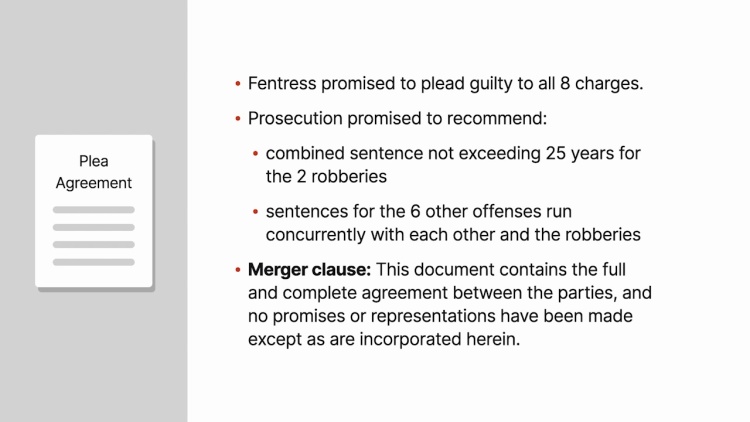United States v. Fentress
United States Court of Appeals for the Fourth Circuit
792 F.2d 461 (1986)
- Written by Mary Pfotenhauer, JD
Facts
Robert Fentress (defendant) entered into a written plea agreement with the prosecution, in a federal criminal case against him, under which Fentress promised to plead guilty to one count of armed bank robbery, one count of bank robbery, and six other federal charges. The prosecution agreed to suggest to the court that the sentence on the first two charges together not exceed 25 years, to run consecutively, and that the sentences imposed on the remaining charges run concurrently with each other and with any other imposed sentence. The written plea agreement stated that it was the full and complete agreement between the parties and that no representations other than those contained in the agreement had been made. At sentencing, the prosecutor introduced a report showing that Fentress had stolen more than $37,000, but the government had recovered only $239. The prosecutor argued that the plea agreement did not include anything on the issue of restitution. The prosecutor also asked the court to run any sentences it imposed consecutively to a 12-year sentence that Fentress was serving for bank robbery in Georgia. The district court sentenced Fentress to 25 years for the bank robbery charges, to run consecutively to Fentress’s 12-year Georgia sentence, and five years for each of the six remaining charges, to run concurrently. The district court also ordered Fentress to make restitution to each of the robbed banks. Fentress appealed.
Rule of Law
Issue
Holding and Reasoning (Wilkinson, J.)
What to do next…
Here's why 911,000 law students have relied on our case briefs:
- Written by law professors and practitioners, not other law students. 47,100 briefs, keyed to 997 casebooks. Top-notch customer support.
- The right amount of information, includes the facts, issues, rule of law, holding and reasoning, and any concurrences and dissents.
- Access in your classes, works on your mobile and tablet. Massive library of related video lessons and high quality multiple-choice questions.
- Easy to use, uniform format for every case brief. Written in plain English, not in legalese. Our briefs summarize and simplify; they don’t just repeat the court’s language.





